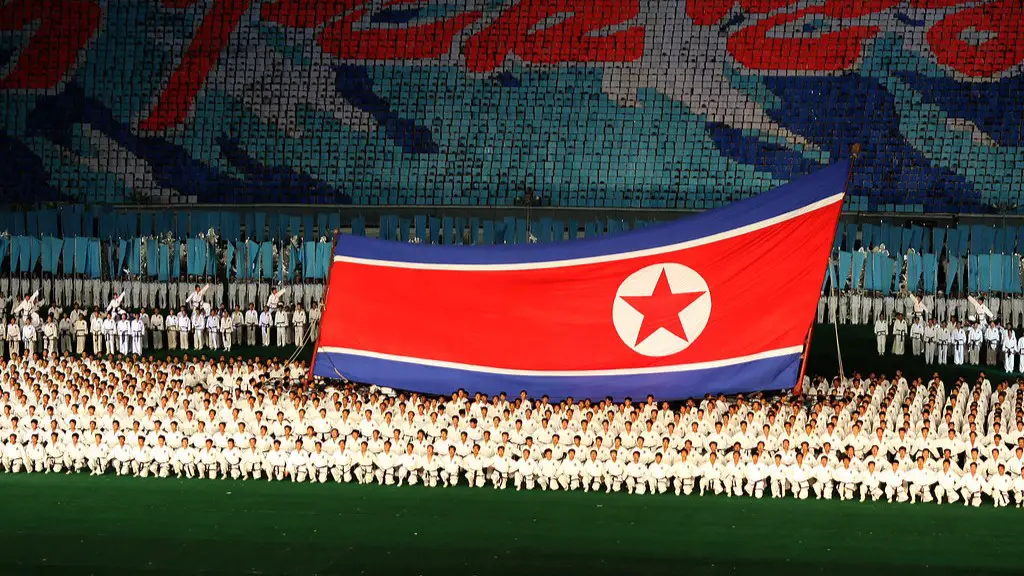Background Information
The United States has had a long and tumultuous relationship with North Korea, and this has been an issue that has spanned several US administrations since the current North Korean regime, the Kim dynasty, came to power following the Korean War in 1950. While there have been numerous military and diplomatic engagements between the US and North Korea, they are still officially at war, as no peace treaty has yet been signed. In recent years, the US has responded to North Korea’s nuclear and missile tests with economic sanctions, diplomatic condemnation, and targeted military shows of force. But despite its military might and superior nuclear capabilities, the US has yet to launch a full-scale attack on North Korea.
Reasons for Inaction
There are a variety of reasons why the US has been unwilling to launch a full-scale attack on North Korea. First and foremost, North Korea is located in a heavily-populated part of the world and any such action would most certainly result in a catastrophic loss of human life. This is something that the US does not want to be responsible for, and any potential action against North Korea would need to be weighed in against this factor. In addition, any military action could also destabilize the entire region, which could have further repercussions for the US’s allies and interests in the region.
Second, any start of a military conflict with North Korea could mean a direct engagement with the strong military of China, a major US trading partner, who has recently voiced its disapproval of President Trump’s hardline stance against the North Korean regime. Such a move could also spark a trade war with China, which could have serious implications for the US economy.
Finally, North Korea is an isolated nation, and there is no guarantee that any action taken against them would be successful in changing their stance on nuclear arms or altering their attitude towards the US. This could result in a lengthy and costly conflict, with no tangible beneficiary on either side.
Economic Sanctions
Given the risks posed by a full-scale US attack against North Korea, the US has adopted a policy of economic sanctions aimed at isolating the country, and weakening them economically. Since 2016, the US has placed a series of sanctions on the North Korean regime, curtailing their access to vital foreign investments and cutting off their access to the international banking system.
The US has also tightened restrictions on North Korea’s exports, including coal, iron, gold, and other minerals. This has severely restricted the regime’s ability to earn foreign currency, and has hampered their ability to purchase vital imports and modernize their military.
In addition, the US has also mobilized the support of its allies, in particular Japan, South Korea, and China, to pressure North Korea through simultaneous economic actions. This has further severed North Korea from the global economy, making it harder for them to procure vital resources, and making it clear that the US and its allies are determined to take action if necessary.
Perspectives from Experts
American military and foreign policy experts have long believed that a full-scale US attack on North Korea is not a viable or prudent option. General Joseph Dunford, current Chairman of the Joint Chiefs of Staff, has repeatedly voiced his concern over the potential human toll of such a conflict and has argued that any military action against North Korea should only be taken as a last resort.
John Bolton, President Trump’s recently appointed national security advisor, has come down firmly on the side of diplomacy, arguing that the only way to pressure North Korea into ending its nuclear program is through a sustained combination of economic sanctions and diplomatic dialogue.
Finally, prominent defense expert James Jeffrey has argued that the US should continue to pressure North Korea through a strategy of “strategic patience”, which focuses on denying North Korea the resources it needs to finance its nuclear program and maintain its military, while still leaving the possibility of a diplomatic resolution open.
Analysis and Insights
The lack of a full-scale attack on North Korea is a matter of great importance, as the potential human and economic toll of such a conflict could be catastrophic. It is clear that the US is unwilling to take any action that could risk the lives of innocent civilians or further destabilize the region.
At the same time, it is clear that the US and its allies are committed to taking all necessary steps to ensure that North Korea does not become a nuclear power and that it respects international law. This delicate balance needs to be maintained, while still offering the possibility of a diplomatic solution.
It is also clear that the strategy of economic sanctions and “strategic patience” has paid off, as the crippling effects of these sanctions have been felt by the North Korean regime and the country’s economy has suffered severely as a result. This has made it clear that the US is determined to take action if North Korea does not change course and renounce its nuclear ambitions.
International Reactions
The US’s policy of avoiding a full-scale attack on North Korea has garnered both criticism and praise from the international community. While some countries have voiced their support for the US’s policy, others have argued that the US should take a more aggressive stance.
Most countries agree, however, that any military action should be a last resort, and that a diplomatic solution should be given the highest priority. This has been the position taken by the United Nations, which has imposed its own sanctions against North Korea and called for dialogue between the two countries.
The US’s reluctance to launch an attack has also been welcomed by the regional powers, such as Japan and South Korea, who fear a full-scale war on their doorstep. For these countries, a diplomatic solution or even a long-term containment strategy is preferable to the alternative.
North Korean Response
Unsurprisingly, the North Korean regime has responded angrily to the US’s policy of avoiding a full-scale attack. The North Korean government has long argued that the US is seeking to wage a “preemptive first strike” against the country, and has accused the US of using its economic sanctions as a tool of “hostile provocation”.
In response, North Korea has continued to develop its nuclear program, in spite of the crippling economic sanctions imposed by the US and its allies. It has also increased its military capabilities, and has conducted a series of missile tests in recent years in an attempt to show that it is prepared to defend itself against any US aggression.
Most tellingly, North Korea has even called on China, its close ally, to openly oppose US policy and to join them in a joint military effort against the US, in order to “repel a potential US war”.
American Intentions
Despite North Korea’s claims, it is clear that the US is not seeking a “preemptive first strike” against North Korea and is instead working to contain the country’s nuclear ambitions and restrain its aggressive posturing. The US has maintained a policy of “strategic patience”, which seeks to limit North Korea’s options and push the regime towards dialogue and peace.
The US has signaled that it is prepared to engage in talks at any time, but has made it clear that any such talks must lead to denuclearization and that North Korea must abide by international law. This stance has been echoed by other regional powers, such as Japan and South Korea, who have both expressed a willingness to open up a dialogue with the North Korean regime.
The US hopes that through this combination of economic sanctions, diplomatic pressure, and strategic patience, a peaceful resolution can be achieved and the US can ensure world security.
Current Trends
The US’s policy of avoiding a full-scale attack on North Korea seems to be having an effect, as tensions between the two countries have been reduced in recent months and there have been some small steps towards diplomacy. This can be attributed to the impact of the economic sanctions, which have had a severe impact on the North Korean economy, as well as to the more conciliatory stance taken by President Trump in recent months.
At the same time, North Korea has yet to take any concrete steps towards denuclearization, and some observers have argued that the North Korean regime is simply buying itself time until the current US administration leaves office. This means that the US must remain vigilant and continues to ensure that any eventual diplomatic solution is reached on its own terms.
Overall, the situation on the Korean peninsula is still tense and unpredictable, and the US must remain committed to its strategy of combining economic and diplomatic pressure with strategic patience in order to ensure the safety of its citizens and its allies.


